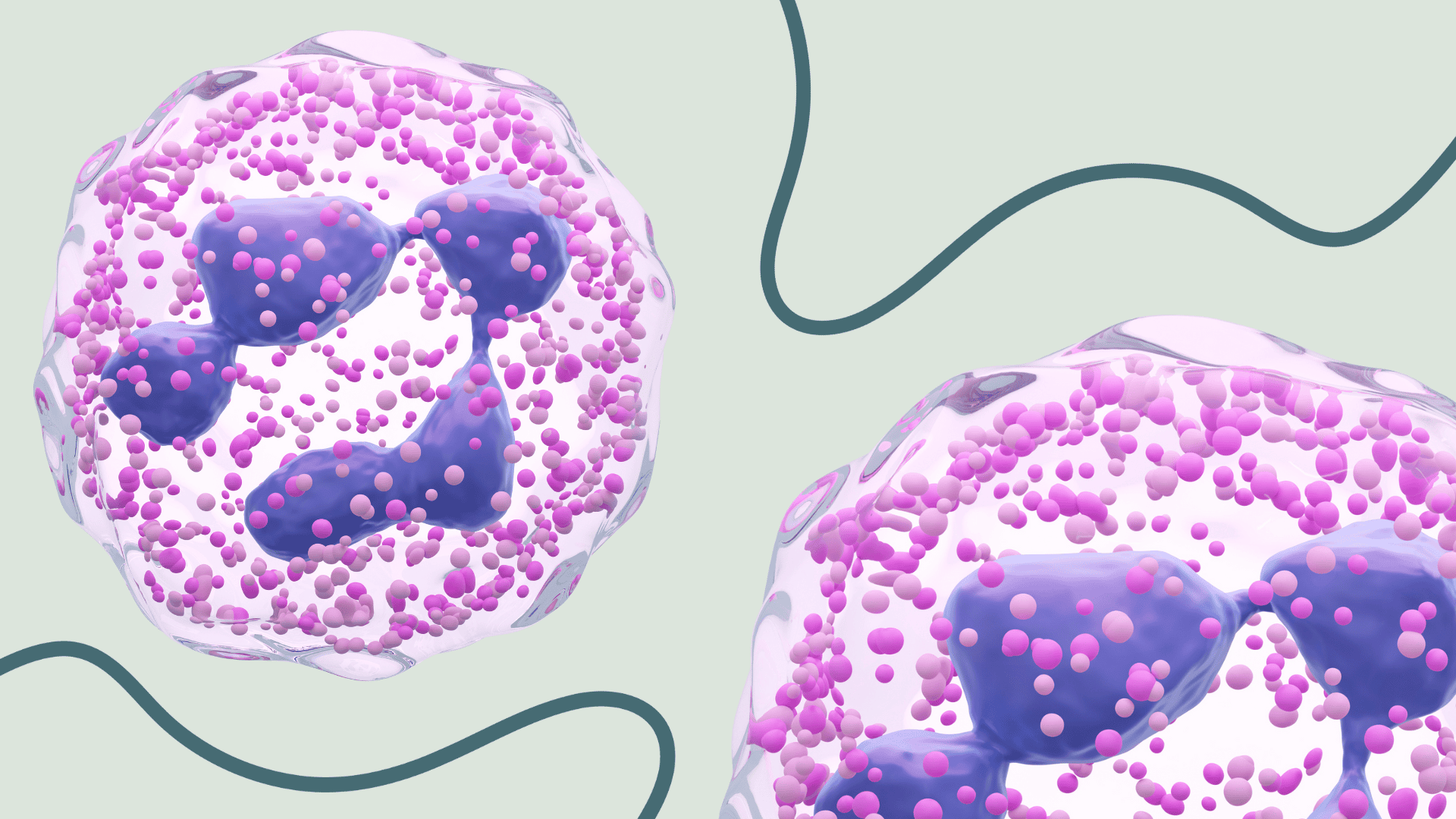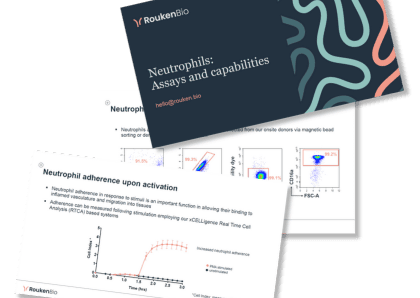Neutrophil Assays
At RoukenBio we employ neutrophils isolated from whole blood collected from our on-site donors to determine their functional responses in relation to various therapeutic interventions. These robust in vitro approaches allow us to tailor each neutrophil assay to the specific needs of diverse therapeutic programmes.

Why Neutrophils?
In addition to being the first line of defence against infection, neutrophils play important roles in autoimmune and inflammatory processes. Their activity is also linked to both pro- and anti-tumour processes. Neutrophils respond to stimulation via pattern recognition receptors (PRRs), antibodies and complement an extensive array of toxic mediators such as myeloperoxidase (MPO), neutrophil elastase (NE), reactive oxygen species (ROS) and cytokines that are actively deployed upon activation. Key effector mechanisms employed by neutrophils include phagocytosis, degranulation and release of neutrophil extracellular traps (NETs).

In vitro Neutrophil Assays Enabling Detailed Assessment of Functional Responses
Neutrophil Activation
Neutrophil Mediated ADCC
Phagocytosis
Neutrophil Activation
At RoukenBio we are equipped to interrogate neutrophil activation in a variety of ways. Flow cytometry allows for comprehensive phenotypic analysis where shedding of CD62L is a key indicator of activation. Detection of soluble effector molecules such as MPO, gives functional insight to our neutrophil activation assays.
Our live-cell impedance platform even allows real-time measurement of neutrophil adherence in response to stimuli, an important function allowing their binding to inflamed vasculature and migration into tissues. This also supports development of neutrophil migration assay formats where appropriate.
Neutrophil isolation and characterisation:

Neutrophils are isolated from fresh whole blood collected from our onsite donors via magnetic bead sorting or density gradient centrifugation.
Neutrophil adherence upon activation:

Neutrophil adherence in response to stimuli is an important function allowing their binding to inflamed vasculature and migration into tissues. Adherence can be measured following stimulation employing our xCELLigence Real Time Cell Analysis (RTCA) based system.
Neutrophil Activation
At RoukenBio we are equipped to interrogate neutrophil activation in a variety of ways. Flow cytometry allows for comprehensive phenotypic analysis where shedding of CD62L is a key indicator of activation. Detection of soluble effector molecules such as MPO, gives functional insight to our neutrophil activation assays.
Our live-cell impedance platform even allows real-time measurement of neutrophil adherence in response to stimuli, an important function allowing their binding to inflamed vasculature and migration into tissues. This also supports development of neutrophil migration assay formats where appropriate.
Neutrophil isolation and characterisation:

Neutrophils are isolated from fresh whole blood collected from our onsite donors via magnetic bead sorting or density gradient centrifugation.
Neutrophil adherence upon activation:

Neutrophil adherence in response to stimuli is an important function allowing their binding to inflamed vasculature and migration into tissues. Adherence can be measured following stimulation employing our xCELLigence Real Time Cell Analysis (RTCA) based system.
Neutrophil Mediated ADCC
Neutrophil mediated destruction of antibody-coated target cells is quantified in an ADCC assay applicable in immuno-oncology studies and therapeutic antibody development. This represents a specialised neutrophil assay format for studying Fc-mediated effector activity.

Cytolysis of SKOV3 target cells monitored by xCELLigence RTCA in the presence of neutrophils and either Trastuzumab IgA2 or Trastuzumab IgG1. Dose dependent ADCC was observed with Trastuzumab IgA2 but not Trastuzumab IgG1 consistent with engagement via CD89.
Phagocytosis
Assess the impact of your therapeutic candidate on the engulfment and digestion of pathogens, particles or cells by neutrophils, applicable to infectious disease research and immune response studies. This phagocytic readout forms an essential part of a comprehensive neutrophil assay strategy.

Neutrophil phagocytosis of bioparticles assessed using Flow Cytometry. pH sensitive bioparticles are non-fluorescent outside of the cell and fluoresce upon entry into the acidic environment of the phagosome. Interruption of phagocytosis results in reduced bioparticle uptake and reduced fluorescence.
Learn more about our Neutrophil capabilities
Discover how our Neutrophil assays can support cutting-edge immunological research and therapeutic development. Various readouts of neutrophil function can be assessed using combinations of flow cytometry and xCELLigence RTCA based systems , including formats suitable for neutrophil migration assay studies where required.
ACCESS THE TECHNICAL PRESENTATION
